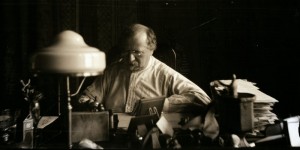Constantin Brunner (1862–1937) is one of the philosophical authors whose work remains to be discovered.  On the occasion of his 150th birthday and the 75th anniversary of his death, the Jewish Museum hosted a conference that traced the whole range of his thought and personality.
On the occasion of his 150th birthday and the 75th anniversary of his death, the Jewish Museum hosted a conference that traced the whole range of his thought and personality.
The German Jewish philosopher, pen-named Brunner while originally named Leo Wertheimer, was born in Altona outside of Hamburg. He studied religion, philosophy, and history in Cologne, Berlin, and Freiburg, and subsequently lived and worked in Hamburg as an editor and writer, until devoting himself to the development of his own philosophical system, starting in 1895 in Berlin and then from 1913 in Potsdam. → continue reading
“It didn’t begin until 1935, when I was sitting over a newspaper in a Vienna coffeehouse and was studying the Nuremberg Laws, which had just been enacted across the border in Germany. I needed only to skim them and already I could perceive that they applied to me. Society, concretized in the National Socialist German state, which the world recognized absolutely as the legitimate representative of the German people, had just made me formally and beyond any question a Jew, or rather it had given a new dimension to what I had already known earlier, but which at the time was of no great consequence to me, namely, that I was a Jew. → continue reading
Migration is a topic of increasing importance for museums, including our own. A conference taking place today in Newcastle (UK) as part of the European Museums in an Age of Migrations (MeLA) project looks specifically at museum displays as they adapt to show social interaction in greater complexity: www.mela-project.eu/events/details/-placing-europe-in-the-museum-people-s-places-identities
 On the occasion of his 150th birthday and the 75th anniversary of his death, the Jewish Museum hosted a conference that traced the whole range of his thought and personality.
On the occasion of his 150th birthday and the 75th anniversary of his death, the Jewish Museum hosted a conference that traced the whole range of his thought and personality.